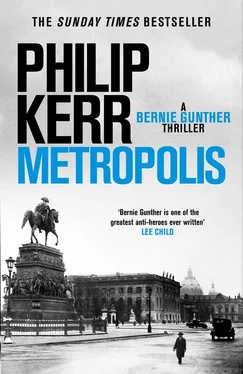‘Carl Severing was a good man,’ said Weiss, ‘but he had too much on his plate, what with having to deal with those bastards in the army — the ones already training in secret for another war. But let’s not get too carried away with Grzesinski. Since he’s also a Jew, it’s fair to say that his appointment isn’t likely to meet with universal enthusiasm. Grzesinski is his stepfather’s name. His real name is Lehmann.’
‘How come I didn’t know that?’ asked Gennat.
‘I don’t know, Ernst, since they tell me you’re a detective. No, I’d be very surprised if Grzesinski lasts long. Besides, he has a secret his enemies are bound to exploit before long. He doesn’t live with his wife, but with his mistress. An American actress. You shrug, Bernie, but it’s only the Berlin public who are allowed to be immoral. Our elected representatives are not permitted to be truly representative; indeed, they are forbidden to have any vices of their own. Especially when they’re Jews. Look at me. I’m virtually a saint. These cigars are my only vice.’
‘If you say so, sir.’
Weiss smiled. ‘That’s right, Bernie. Never accept anyone’s word for their own recognizance. Not unless they’ve already been found guilty.’ He wrote a note on a piece of paper and pressed it on the blotter. ‘Take this to the cashier’s office. They’ll give you a new paybook and a new warrant disc.’
‘When do I start, sir?’
Weiss pulled at his watch chain until a gold hunter lay on the palm of his hand.
‘You already have. According to your file, you have a few days’ leave coming up, is that right?’
‘Yes, sir. Starting next Tuesday.’
‘Well, until then you’re the Commission’s weekend duty officer. Take the afternoon off and acquaint yourself with the Silesian Station files. That should help you stay awake. Because if anyone gets murdered in Berlin between now and Tuesday, you’ll be the first on the scene. So let’s hope for your sake it’s a quiet weekend.’
I cashed a cheque at the Darmstädter and National Bank to tide me over the weekend and then walked on to the enormous statue of Hercules; muscular and grumpy, he carried a useful-looking club over his right shoulder and except for the fact he was naked, he reminded me a lot of a beat copper who’d just restored order to some east-end drinking den. Despite what Bernhard Weiss had said, a bull required more than just a warrant disc and a strong word to close a bar at midnight; when Germans have been boozing all day and half the night, you need a friendly persuader to help you bang a beer counter and command their attention.
Not that the children leaning over the edge of the fountain paid Hercules much attention; they were more interested in the coins that had been tossed into the water over the years and in calculating the huge fortune that lay there. I hurried past the place and headed towards a tall house on the corner of Maassenstrasse with more scrollwork than a five-tier wedding cake and a top-heavy balcony facade that put you in mind of Frau Weitendorf herself.
I had two rooms on the fourth floor: a very narrow bedroom and a study with a ceramic stove that resembled a pistachio-coloured cathedral and a marble-topped washstand that always made me feel like a priest when I stood in front of it to shave and wash myself. The study was also furnished with a small desk and chair, and a squarish leather armchair that creaked and farted more than a Baltic sea captain. Everything in my rooms was old and solid and probably indestructible — the sort of furniture the Wilhelmine manufacturers had intended to last at least as long as our empire, however long that might have been. My favourite piece was a large framed mezzotint of Georg Wilhelm Friedrich Hegel; Hegel had thin hair, hammocks under his eyes, and what seemed to be a very bad case of wind. I liked it because whenever I had a hangover I looked at it and congratulated myself that however bad I felt I couldn’t feel as bad as Hegel must have felt when he’d sat for the man laughingly known as the artist. Frau Weitendorf had told me she was related to Hegel on her mother’s side and that might have been true except that she also informed me Hegel was a famous composer, after which it became clear she meant Georg Friedrich Händel, which made her story seem a little less likely. To maximize her rental income her own room was on the upper-floor landing, where she slept behind a tall screen on a malodorous daybed she shared with her two French bulldogs. Practicalities and the need for money outweighed status. She might have been the mistress of her own house, but she certainly never saw any of her lodgers as slavishly subordinate to her will, which was quite Hegelian of her, I suppose.
The other lodgers kept themselves to themselves except at mealtimes, which was when I got to know Robert Rankin, the good-looking, cadaverous Englishman who had the rooms underneath mine. Like me he’d served on the Western Front, but with the Royal Welch Fusiliers, and after several conversations we realized we’d faced each other across a stretch of no-man’s-land during the Battle of Loos, in 1915. He spoke near-perfect German, probably on account of the fact that his real name was von Ranke, which he’d been obliged to change during the war for obvious reasons. He’d written a novel about his experiences, called Pack Up Your Troubles , but this had proved unpopular in England and he was hoping to sell it to a German publisher just as soon as he had translated it. Like most veterans, myself included, Rankin’s scars were mostly invisible: he had weakened lungs from a shell blast at the Somme, but more unusually he’d been electrocuted by a field telephone that had been hit by lightning and this had left him with a pathological fear of using any telephone. Frau Weitendorf liked him because his manners were impeccable and because he paid her extra for cleaning his room, but she still called him ‘the spy’ when he wasn’t around. Frau Weitendorf was a Nazi and thought all foreigners were not to be trusted.
I arrived back at the house with the briefcase full of police files and crept quickly up the stairs to my room, hoping to avoid anyone who might be at home. I could hear Frau Weitendorf in the kitchen talking to Rosa. Most recently Rosa was playing her tenor sax at the upmarket Haller-Revue on Friedrichstrasse, which was the classiest of all the titty shows in Berlin, with a casino and VIP sections, and a very good restaurant. But there were lots of reasons to dislike the place — not least the number of people crowded into it, many of them foreigners — and the last time I’d been there I’d promised myself and my wallet that I’d never go again. I was certain that when she finished playing her sax Rosa wasn’t above earning extra cash on the side. Once or twice I had returned very late from the Alex to find Rosa sneaking a client upstairs. It was none of my business and I certainly wouldn’t have told ‘the Golem’ — which was what all the lodgers called Frau Weitendorf, on account of the fact that she wore a large stiff yellow wig that resembled a large loaf of bread and was exactly like the monster’s in the horror film of the same name.
The fact was, I had a soft spot for Rosa and hardly felt qualified to judge her for trying to earn a bit more. I could have been mistaken, but eavesdropping on the stairs one day I gained half an idea that Frau Weitendorf might have been trying to set Rosa up with one of her friends from the Nollendorfplatz Theater, where, as she never tired of telling us, she’d once been an actress — which meant that the Golem was probably doing a bit of pimping on the side.
In fact, after the inflation of 1923, nearly everyone, including a lot of cops, needed a little back-pocket business to help make ends meet, and my landlady and Rosa were no different from everyone else. Most people were trying to make enough to get by, but it was never enough to get ahead. I knew plenty of cops who sold drugs — cocaine wasn’t actually illegal — illicit alcohol, homemade sausage, foreign currency, rare books, dirty postcards, or watches lifted from the bodies of the dead and the dead drunk they found in the streets. For a while I supplemented my own wages by selling the odd story to Rudolf Olden, a friend at the Berliner Tageblatt . Olden was a lawyer as well as a journalist and, more important, a liberal who believed in free speech; but I stopped when Ernst Gennat saw me talking to him in a bar and threatened to put two and two together. Not that I’d ever have given Olden any sensitive information; mostly it was just tips about Nazis and communists in Department 1A, the political police, which was supposed to be staffed by cops who were free of any party allegiances. For example, I gave Olden some notes I took of a speech Commissioner Arthur Nebe gave at a meeting of the Prussian Police Officers’ Association, the Schrader-Verband. And while Olden didn’t mention Nebe by name, everyone at the Alex knew who was being quoted in the paper.
Читать дальше












